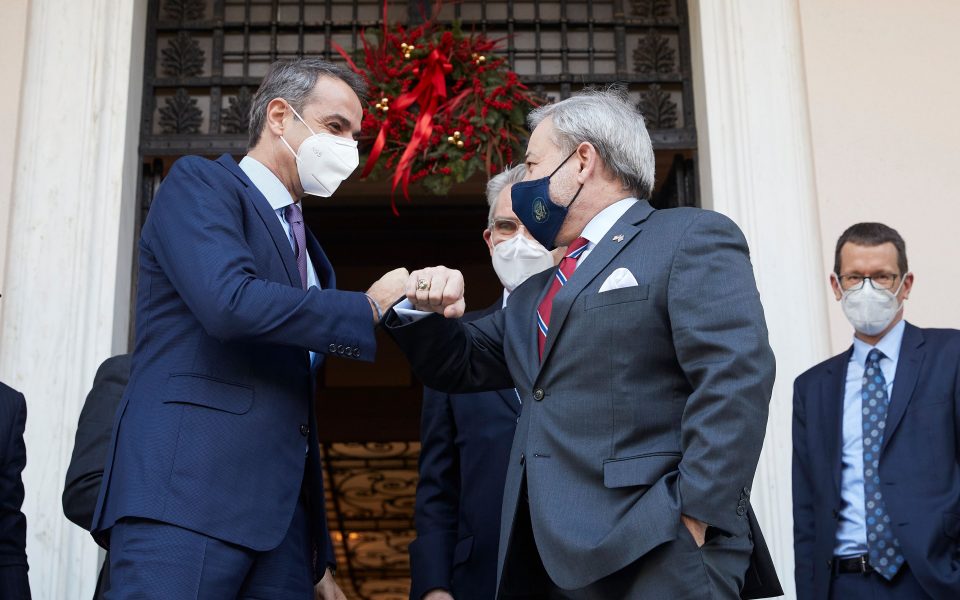Mitsotakis faces Gordian knot over name dispute

Conservative opposition leader Kyriakos Mitsotakis is experiencing the absurdity of Greece’s political reality. Prime Minister Alexis Tsipras and Foreign Minister Nikos Kotzias are the ones negotiating a possible solution to the name row between Athens and Skopje, a political hot potato for all previous administrations, but it’s the New Democracy chief who has found himself under the greatest strain.
Even if the latest diplomatic campaign on the name dispute is animated by sincere motives (given the election of moderate Zoran Zaev – whom Tsipras met on Wednesday on the sidelines of the World Economic Forum in Davos – as prime minister of the Former Yugoslav Republic of Macedonia) rather than being a cynical maneuver aimed at splitting the conservative opposition, the latest developments have certainly shaken New Democracy, threatened its cohesion, and could trigger developments in the Greek center-right and even influence the outcome of the next general election.
Tsipras appears prepared to agree to a compromise solution. His coalition partner Panos Kammenos is unlikely to stand in his way. After all, the leader of the right-wing Independent Greeks (ANEL) party has proved to possess the necessary “flexibility,” as it were, when required. And even if Kammenos refused to back a compromise solution, Tsipras will try to secure the support of the Movement for Change (the country’s new center-left alliance including PASOK socialists and To Potami centrists) in order to vote such a deal through Parliament.
Doing so would allow Tsipras to style himself as a problem solver in the eyes of Greece’s foreign partners and allies. At the same time, it could open the path for a future coalition with center-left leader Fofi Gennimata – something that would please Europe’s social democrats.
In any case, and regardless of what Tsipras decides to do in the end, the one who is now facing the biggest problem is the leader of New Democracy. Mitsotakis, a moderate, liberal and pro-Europe politician, would consent to an honest compromise that would heal a wound that has hurt the country for 25 years. After all, a composite name for all uses had been the clear position of the Costas Karamanlis administration. It allowed Athens to claim a success at the 2008 NATO summit in Bucharest, for it was inspired by compromise, not maximalism.
However, if Mitsotakis dares to be himself, he risks losing control of his party. Officials belonging to the so-called Karamanlis faction have distanced themselves from a position that they endorsed in the past; those who have close ties to ex-premier Antonis Samaras have their own take on developments; while members of New Democracy’s populist right wing seem to be waiting for Mitsotakis around the corner. The latter could get some help from the party’s vice president Adonis Georgiadis, but only so much. The balance is delicate, and all sides are afraid of what is at stake.
If the New Democracy chief adopted a moderate position and voted for a mutually acceptable settlement, he would suffer some in-party political damage. At the same time, it’s far from certain that he would receive any credit from Greece’s partners and allies abroad. On the other hand, all of these would be the first to attack him if he failed to throw his weight behind a settlement. He has no easy choices in front of him. In any case, he could wait and see the agreement, if there is one, and then make up his mind.
Rarely has a political leader found himself in such a difficult position.





